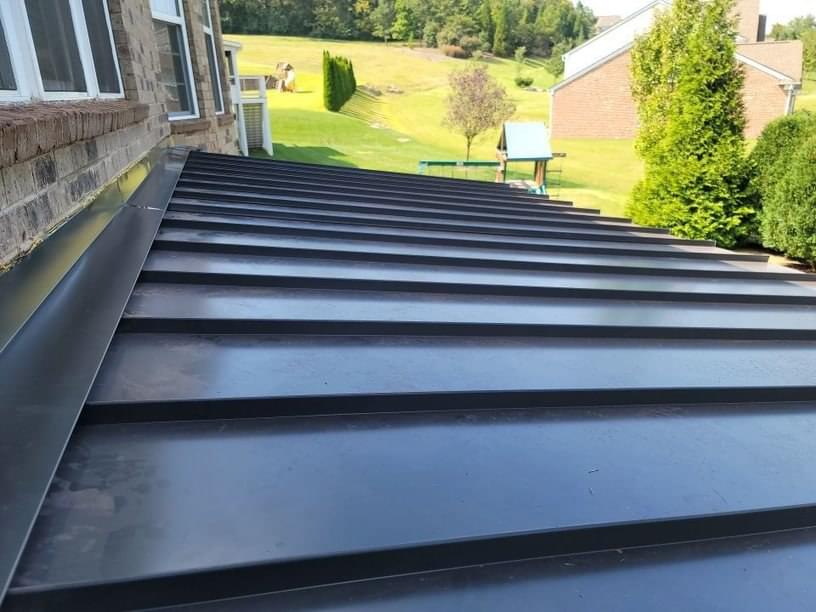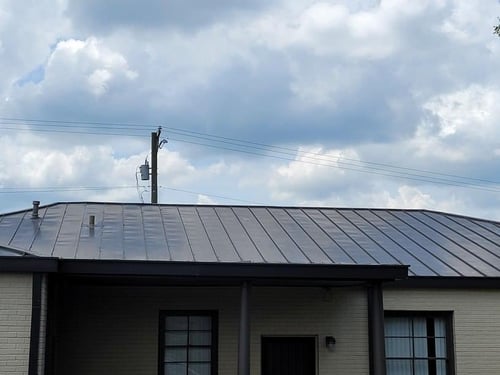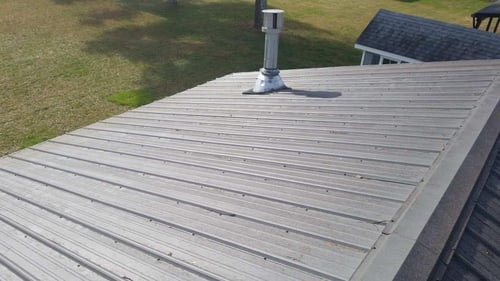What’s the Most Common Gauge Used in Residential Metal Roofing?

As metal roofing’s popularity rises for residential purposes, homeowners have a lot of questions. While there are common questions about lifespan and cost, others are a little more specific.
One of the newest questions homeowners like you are asking has to do with the gauge of metal used in residential roofing. While there are multiple options, there’s one that I recommend for residential metal roofing.
For over 30 years, the team at Bill Ragan Roofing has educated homeowners on everything they need to know about metal roofing and roofing in general. Because of this, I’ll give you the gauge of metal I always recommend for anyone looking to put a metal roof over their home.
I’ll start this article by diving right into the most common gauge used for metal roofing. After that, I’ll give you 4 crucial things you need to know about residential metal roofing.
What’s the most common gauge used in residential metal roofing?
The most common type of metal used for residential roofing (for accent purposes and entire roof systems) is steel. Popular steel panel gauge options are 22, 24, 26, and 29.
The difference between the gauges of steel panels is the thickness. The higher the number, the thinner the metal panels.
Of the options available, 24 gauge steel and 26 gauge steel are the most commonly used in residential metal roofing. But because 26 gauge steel metal roof panels are thinner, they have a higher chance of oil canning.
Oil canning occurs when the metal panels are fastened too tightly together. This causes a “bubbling” look that eventually turns into a wavy look on the steel panels.
 (Example of oil canning)
(Example of oil canning)
While it doesn’t cause any functionality problems, it does cause an aesthetic issue that some homeowners don’t like. To lower the chances of this happening, we recommend homeowners go with a little more thickness with a 24 gauge steel metal roof offers.
Both 24 and 26-gauge steel are great choices for residential metal roofing. But just keep in mind that oil canning is a potential problem with a 26 gauge steel metal roof.
4 more things to know about residential metal roofing
Now you know the most commonly used gauges of metal used in residential roofing and the gauge I recommend. But there’s even more to know about residential metal roofing.
Let’s get to the 4 more things you need to know about getting a metal roof for your home.
1. The recommended type of metal roof for residential roofing
You have 2 types of metal roof system options, screw-down panel or standing seam.
.jpg?width=500&name=StandingSeamMetalRoof%20(2).jpg)
A standing seam metal roof system is a series of panels locked together at the seams or seamed mechanically, which allows them to expand and contract freely when the metal heats up.

A screw-down panel (or exposed fastener) is exactly what the name says; it's screwed down. But because the screws are screwed through the panel, there’s no room for the metal to expand and contract.
Because it can’t expand and contract freely, I don’t recommend putting a screw-down panel over a heated space such as your home or office. But just because I don’t recommend it doesn't mean you won’t see a screw-down panel on homes.
But here at Bill Ragan Roofing Company, I always recommend a standing seam metal roof system to anyone looking to add metal to their residential home. Because of this, I’ll use a standing seam metal roof as the baseline for the rest of this article.
2. A metal roof makes noise when it rains
Homeowners always ask about the noise factor of a metal roof before getting one over their home. No matter what, you’ll get an echo when rain hits a metal roof.
It’ll be quieter if it’s installed over solid decking because the wood under the metal panels helps absorb some noise. You can also add wood fiber insulation boards between your roof’s decking and your metal panels to help with the noise even further.
They won’t completely block out a heavy downpour, but the insulation boards provide an extra layer to absorb sound from rain. Like I said earlier, a metal roof will make some noise when it rains, no matter what.
Even when adding extra layers to absorb the sound, it’s impossible to completely drown out a heavy thunderstorm.
3. The painted finish warranty on the metal roofing panels
All of the major steel manufacturers use a patented process to apply a painted finish called Kynar 500 to the panels of a standing seam metal roof. The Kynar 500 painted finish protects the steel standing seam metal panels from the elements and keeps the color from fading.
Once the steel panels are installed, you’ll have a 30-year paint warranty on a standing seam metal roof. While the warranty only guarantees the painted finish for 30 years, it won’t just disappear after the 30-year mark.
But once the paint warranty expires, you should start budgeting for a new metal roof, so you’re ready when the time comes for a replacement.
4. How long a residential metal roof will last
Without the Kynar 500 painted finish I just talked about, you won’t get the longevity expected out of a standing seam metal roof. This brings us to the last thing you need to know, how long a residential standing seam metal roof will last.
One of the biggest (if not the biggest) reasons metal roofing is becoming popular for residential purposes comes down to the lifespan. As long as the panels are properly installed and your attic is adequately ventilated, you should have no problem getting 30 years out of a standing seam metal roof.
The number can be pushed to 50 years in the right conditions. However, you won’t get this longevity if you don’t hire a roofing contractor that has experience installing metal roofing.
For example, if the painted finish on the metal panels is scratched or damaged during installation, the exposed fresh steel will rust from the dew and moisture in the air. This shortens the lifespan of your standing seam metal roof.
For this reason, it’s crucial to find a local roofing contractor that takes all the proper precautions to protect the finish during installation.
How much will a residential metal roof cost?
Now you know 4 more things to know about residential metal roofing. But there’s still one more important thing I didn’t cover, how much it’ll cost.
If you’re like most homeowners, you’re probably concerned about the cost of a new metal roof. Unfortunately, the roofing industry doesn’t like to talk about pricing.
Luckily, I have no problem sharing this knowledge to help homeowners understand the investment they’re about to make. That’s why I wrote another article breaking down the budget you’ll need for a residential metal roof.
Since 1990, the team at Bill Ragan Roofing has provided high-quality metal roofing installations for homeowners in Nashville and surrounding Middle Tennessee areas. Whether you want a full metal roof replacement or just an accent, you can count on your metal roof to last.
Check out How Much a Metal Roof Replacement Costs to learn what you can expect to pay for a new metal roof.


